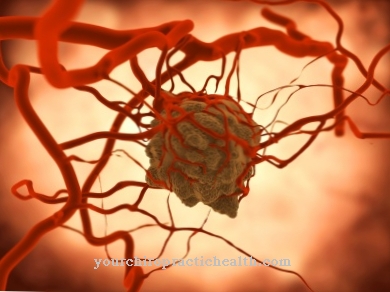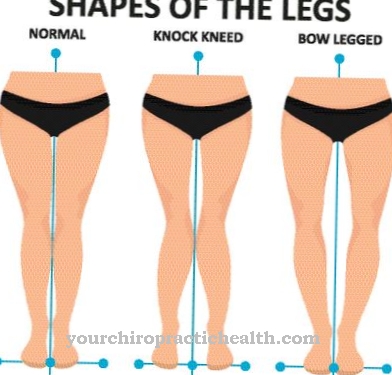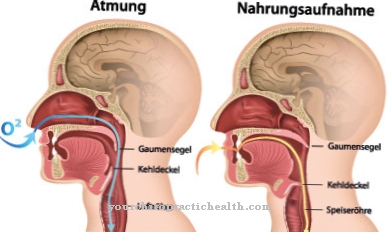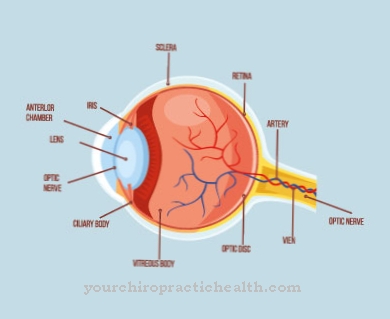The Epiglottitis - also Epiglottitis - is a disease caused by bacteria. Although this disease occurs rarely in the 21st century, immediate action is required if suspected, as it is life-threatening and, if left untreated, leads to death. The epiglottitis is most common in children under 6 years of age, but adults can also become infected with epiglottitis.
What is epiglottitis?
.jpg)
Epiglottitis is a bacterial infection that can cause life-threatening inflammation of the epiglottis. The epiglottis is part of the larynx and serves as a separation between the trachea and esophagus. When you swallow, the epiglottis lies over the entrance of the larynx and closes the windpipe so that food and fluid can enter the esophagus.
In epiglottitis, the mucous membranes of the epiglottis swell as well as the tissue of the wider area such as Larynx muscles or lower pharynx. This massive swelling can partially or completely block the windpipe, which can lead to acute shortness of breath or suffocation. Epiglottitis should not be confused with pseudocroup, which has similar symptoms. As a rule, children of preschool age develop epiglottitis, less often adults. Epiglottitis occurs only in humans.
causes
The cause of epiglottitis is an infection with bacteria. However, the cause or the bacterium for epiglottitis differs in children and adults.
In children, the cause is usually an infection with the bacterium "Haemophilus influenzae type B". The pathogen is transmitted through so-called contact or droplet infection. In adults, epiglottitis is often caused by pneumococci. The pathogens are "Streptococcus pneumoniae" and "Staphylococcus aureus".
Epiglottitis often occurs without another previous disease. In exceptional cases, there may have been an untreated infection of the nasopharynx that has spread. However, due to thorough vaccination measures, epiglottitis is rarely found.
You can find your medication here
➔ Medicines for shortness of breath and lung problemsSymptoms, ailments & signs
Acute epiglottitis is a fulminant clinical picture in which the severe symptoms develop within a few hours. If you are completely healthy, you typically experience a high fever and a rapid deterioration in your general health. The swelling of the epiglottis leads to a sore throat and painful swallowing disorders with increased salivation.
The children cannot or do not want to speak anymore and refuse solid and liquid food. The saliva typically runs out of the mouth. Another main symptom of epiglottitis is the inspiratory stridor, a wheezing sound that occurs when you inhale. This is followed by a snoring exhalation, the so-called crawling breathing.
The increasing swelling of the epiglottis leads to obstruction of the upper airways with increasing shortness of breath. Patients adopt a typical posture to make breathing easier. Sitting, with the torso bent forward, you take your head back and breathe with your mouth open to widen your airways.
The changed language is also noticeable. It impresses as a "lumpy", often painful way of speaking. In the area of the neck and head, swollen lymph nodes can often be felt. Cough, on the other hand, is an atypical symptom of acute epiglottitis and occurs rather rarely.
Diagnosis & course
The doctor will diagnose epiglottitis. They can be recognized by symptoms such as shortness of breath, high fever, heavy salivation, severe sore throat and pain when swallowing. Other signs include Refusing to eat, having trouble speaking, and refusing to lie on your back.
Palpation of the neck reveals severely swollen lymph nodes. If these symptoms are less pronounced, the infection can be determined by means of a blood count. The type of pathogen can also be determined with the help of the blood sample, which enables epiglottitis to be treated more precisely.
The symptoms of epiglottitis develop and worsen within a few hours, so that the sick person is referred to the hospital immediately based on the symptoms. Since the mucous membranes around the epiglottitis swell very strongly in epiglottitis, severe shortness of breath occurs in the further course, which can lead to death by suffocation. If the disease is treated in time, the epiglottitis usually heals without any consequences.
When should you go to the doctor?
If you experience persistent breathlessness or breathing disorders, you should consult a doctor. If there are interruptions during night sleep due to breathing difficulties, a doctor's visit is necessary immediately.
If the person concerned suffers from a sore throat, a tightness in the throat or severe difficulty swallowing, these symptoms should be examined by a doctor and treated. A doctor visit should take place if the vocalization is interrupted or the voice sounds constantly hoarse. If the supply of food is not possible for several days or if it is vehemently refused, there is a risk of an undersupply of the organism.
A doctor's visit is necessary in order to initiate medical treatment. Refusing to take in fluids increases the risk of dehydration. This can lead to a life-threatening condition that must be treated as quickly as possible. As soon as the person concerned notices that the mucous membranes in the mouth and throat area are swelling, they should consult a doctor.
If you feel generally ill, feel unwell or feel physically weak, it is advisable to consult a doctor. If symptoms such as dizziness, unsteady gait or disorders of consciousness occur, a doctor's visit is urgently required. Problems with the heart rhythm, palpitations or high blood pressure are cause for concern. In order not to cause life-threatening conditions or permanent damage, a doctor should be seen as soon as possible.
Doctors & therapists in your area
Treatment & Therapy
If epiglottitis is suspected, the patient must be admitted to hospital immediately so that adequate therapy can be given in good time. Certain things need to be taken into account when transporting to hospital. The transport route should be as short as possible and should be accompanied by a doctor or an emergency doctor.
Because of the swelling, breathing is impaired, so make sure you sit upright. Sick people panic easily due to the reduced breathing, so that one should always calm the patient down. Sedatives are contraindicated in epiglottitis because they have a negative effect on breathing.
Keeping the airways clear is the top priority in epiglottitis. It usually takes place an intubation, which should be done as early as possible. A tube is inserted into the windpipe, which is used for further ventilation. As a further measure, so-called adrenaline sprays can also be administered to reduce the swelling. In extremely serious cases in which the airways are so swollen that intubation is no longer possible, a tracheotomy, a so-called tracheal incision, is performed.
After the airway has been secured, the epiglottitis is treated with antibiotics. In children, the bacterium is treated with the active ingredient cefotaxime, in adults with cefuroxime. Furthermore, so-called corticosteroids are used, which have a decongestant and anti-inflammatory effect. Treated in time, the epiglottitis heals without consequences.
Outlook & forecast
The prognosis of epiglottitis is linked to the progression of the disease at the time of diagnosis. If the inflammation is discovered and treated in good time, the symptoms will be alleviated within a few days. Usually the disease is completely healed within a few weeks. The patient is symptom-free and does not have to expect any consequential damage.
The course of treatment can be longer if there are other diseases that also weaken the immune system or the patient has an unhealthy lifestyle. In these cases there are too few defenses in the organism. The effect of the medicine is delayed to the extent necessary.
If the epiglottitis is at an advanced stage, there is a risk of serious complications. In addition to hoarseness, pain and other complaints, the patient can die. The disease is fatal in 10-20% of those affected. The patient is at risk of death from suffocation if no medical care is provided or if it is used late.
An emergency doctor is required if a collapse or acute shortness of breath occurs. Depending on the patient's condition, this can provide artificial ventilation as part of a life-saving measure or emergency operation. Then drug treatment is initiated. The patient must remain in the hospital until the inflammation subsides. Timely treatment is therefore essential for a good prognosis.
You can find your medication here
➔ Medicines for shortness of breath and lung problemsprevention
Epiglottitis is caused by bacteria. The disease can be prevented with the help of a vaccination. The vaccination called Haemophilus influeanzae type B - generally known as Hib - by the STIKO (Standing Vaccination Commission of the Robert Koch Institute) is recommended for infants. As a so-called combination vaccination, the active ingredient against epiglottitis is injected together with other childhood diseases.
You can do that yourself
Children who suffer from epiglottitis often wake up at night and show panic behavior because they cannot breathe. So that fear does not increase the shortness of breath further, it is important to have a calming effect on the child.
Support calm conversations with the child and physical closeness so that the child can breathe slowly again. A window in the bedrooms should be open overnight so that there is always enough oxygen in the room. The window should be opened wide in the event of a nocturnal attack of shortness of breath.The fresh air is helpful as the coolness helps reduce the swelling of the mucous membranes.
In addition, it can be perceived as pleasant when hot water is turned on in the bathtub or in the shower. The increased humidity creates a calming feeling. However, the success of this method has not been statistically proven.
If you have epiglottitis, speaking and screaming loudly should be avoided. The consumption of spicy foods such as chilli or pepper is not recommended. These irritate the airways and lead to an increase in symptoms. The consumption of harmful substances such as nicotine and alcohol should also be avoided. They also attack the airways and impair the functionality of the larynx.






.jpg)






.jpg)

.jpg)
.jpg)











.jpg)